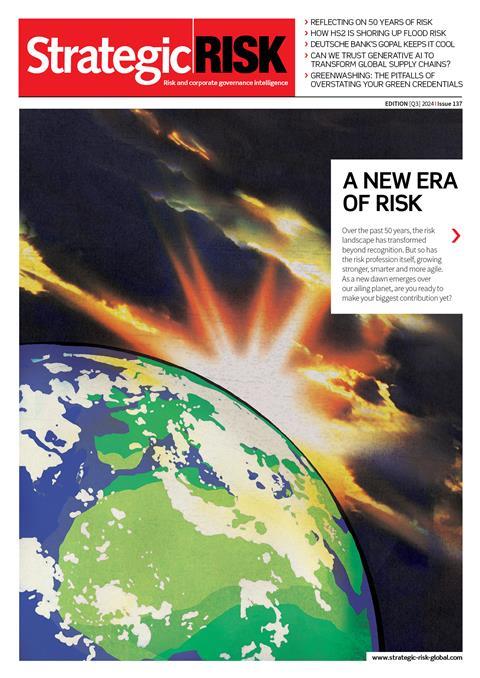Since 9/11 the threat posed by terrorism has often preoccupied the minds of many CEOs. However, commercial pressures are increasingly forcing companies to look to new markets to grow business. New markets mean new risks, and it is fast becoming apparent that a more pronounced threat than terrorism exists in respect of a company's reputation. Indeed, a recent survey by the ICAEW (Institute of Chartered Accountants in England and Wales) and The Risk Advisory Group showed that risk to reputation was frequently ranked as one of greatest threats facing companies today.
A good reputation will enhance your profitability and contribute to overall long term success. A change in reputation will probably affect earnings and create negative public opinion. It typically results in loss of sales, a drop in share value and a breakdown of relationships.
For example, the recent interventions by Eliot Spitzer, the New York Attorney-General, have sent tremors through corporate America and caused share prices to tumble on the hint of an investigation. If that is not a sufficient shock to the system, Moody's and other credit ratings agencies often simultaneously review credit ratings and debt, eyeing the loss of business arising from the potential damage to reputation.
Risk to reputation is no longer an intangible that can be brushed aside.
It can sound the death knell of the organisation.
How a company manages its reputation must therefore now move outside the traditional role of PR. It necessitates an integration of the hard and soft sides of a number of previously fragmented functions. The hard aspect includes processes driven by regulatory requirements such as SOX (Sarbanes-Oxley) or corporate governance issues and is likely to include audits, committees and reporting requirements. The soft aspect will include corporate culture, integrity, people, and ease of communication.
Creating a process to manage these seemingly disparate functions will pinpoint vulnerabilities, should stimulate discussion, and possibly pre-empt crisis management, which by definition implies a siege mentality.
It will not, of course, prevent a damaging event from occurring, but it will propagate the right mindset throughout the organisation and reinforce the collective responsibility of all employees.
Potential damage is also possible as companies seek to outsource functions.
The dangers of being associated with the wrong business partner may wreak havoc on your reputation. Engaging in expanded due diligence and integrity checks will help to offset this risk.
Consultants are not immune
Reputational risk is not only a hazard for large companies. SMEs and consultants also face potential damage to reputation in an increasingly competitive marketplace. A consultant operating in a marketplace with three or four competitors, which is struggling to fulfil a contract is likely to find that its reputation is pummelled.
In the past, some consultancies - both large and small - have taken a cavalier attitude to reputational risk. Too often the emphasis on longer and longer planning horizons has meant that consultants could take their sometimes inflated fees and disappear long before the poor quality of their work was able to damage their reputation. Since the market for consultancy has grown at an average rate of 20% each year since World War II, even the ineptness that has helped to bring profitable corporates to ruin has not been enough to damage the teflon-coated major consulting firms.
In the US it has been common to see one major consultancy advising a client in preparing the case to sue a competitor, while that same competitor was busy helping another to sue a further member of the consulting fraternity.
So there was a litigation merry-go-round, in which it appeared to the innocent observer that consulting firms made a substantial share of their revenues adding their ten cents worth to the compensation culture.
The fall and fall of Andersen and the growth of competition have combined to make many consulting firms begin to address their own weaknesses - in some cases for the first time. Now there is every reason to believe that the Big Four accountancy firms are back into consulting in a big way. 'Will they be able to protect their reputations any better than their predecessors did?' is the burning question.
William Pitt, a man not noted for his modesty said, "I have called a new world into being to redress the balance of the old". The International Centre for Consulting Excellence makes a similarly immodest claim. It has set out to redress the reputation of the consulting profession. We must succeed, because if we fail it will take more than the current fad of business process outsourcing to save the neck of the goose that has laid such a multitude of golden eggs for so long.
Our research shows that consultants must learn to deliver speedy and reliable results quickly and economically, or their livelihoods will go the way of all flesh. There are too many excellent alternatives to consultancy as it has often been practised.
The argument is as simple as it is compelling. With blogging and media coverage growing quickly, a reputation can be destroyed in a matter of days or even hours. Risk analysis, followed by action to protect our most valuable asset is an essential for every organisation. Consultants must be ready both to protect their own prosperity and play a part in defending that of their clients.
- Professor Tom Lambert is chief executive of the International Centre for Consulting Excellence (CfCE); Mark Townsend is a member of the CfCE advisory board and founder of Synthesis Management Consultants,



















